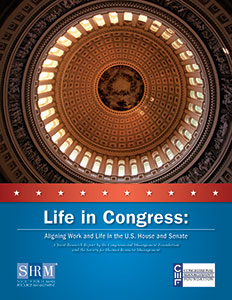
The Congressional Management Foundation (CMF) and the Society for Human Resource Management (SHRM) partnered to conduct a study about working in Congress.
“Life in Congress: Aligning Work and Life in the U.S. House and Senate,” focuses on how House and Senate staff manage work and life issues and is based on a survey of more than 1,400 congressional staff.
It offers an inside look at the workloads of congressional staff and their struggles in managing the multiple demands of work, family and personal responsibilities.
- Review the key findings
- Read the press release
- Download the report:
 "Life in Congress: Aligning Work and Life in the U.S. House and Senate" (PDF - 2.83 MB)
"Life in Congress: Aligning Work and Life in the U.S. House and Senate" (PDF - 2.83 MB) - Attend work-life training programs
- Learn more about the "Life in Congress" Project
Report Key Findings
Work Schedules
- Congressional staff, both in Washington and in district and state offices, work more than 40 hours per week on average. Washington staff report that they work 53 hours per week when their chamber is in session, compared to 43 hours per week when out of session. For the district/state staff, their number of hours worked per week seems stable (45-47 hours) irrespective of whether their chamber is in session or not.
- Congressional staff were asked to assess their work hours to a comparable private sector job. More than half (56%) of congressional staff believe that they work longer hours than their counterparts holding similar job responsibilities in the private sector.
- Despite the long hours, congressional staff display a very high level of commitment to their jobs. Almost 75% of the respondents rated “meaningfulness of their job” as being very important to them, as opposed to 35% of U.S. employees who held similar beliefs.
Importance and Satisfaction with Work-Life Aspects of Their Job
- “Overall office culture” is the aspect rated as most important to congressional staff, with 79% of respondents rating it as “very important.” In comparison, only 46% of U.S. employees cited “overall corporate culture” as being very important to their job satisfaction.
- While more than half (55%) of congressional staffers feel that “flexibility to balance life and work issues” is very important, only one in every four (26%) is very satisfied with this flexibility – a gap of 29 percentage points.
Staff Opinions about Working in Congress
- Many congressional staff feel that they do not have enough time to perform assigned tasks. When asked, “I usually have enough time to get everything done,” 33% disagreed. This sentiment is felt most strongly among staff in policy/legislative/research roles, with almost half (48%) reporting that they disagree with this statement.
- Not only do congressional staff question whether they have enough time to complete tasks, many also feel that the quality of their work is suffering under their workload. When asked, "I have too much to do to do everything well," 28% of staff agreed with this statement.
- Given staff concerns about their workload and quality of their work product, it is not surprising that when asked if "Job burnout is a significant problem in my office," 32% of congressional staff agreed.
- When asked, "I have adequate time for my personal life," 32% of congressional staff disagreed. This sentiment is most prevalent among Washington-based staff, with 43% of DC staff disagreeing with this statement and 23% of district and state staff disagreeing.
Reasons for Leaving Employment
- "To seek better balance between work and personal life" was cited by 38% of staff as a reason for leaving Congress and 30% of staff as a reason for leaving their current job or office.
- Significant gaps between positions arose when asked for reasons why they would leave employment in Congress. For example, 55% of Washington-based press/communications staff cited "To seek balance between work and life" as a reason to leave Congress, compared to 27% of district- or state-based staff.


